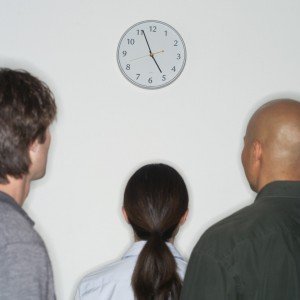Stop it. Stop it right now. Stop clock watching. Stop tracking time.
 You know the drill.
You know the drill.
Timesheets. Billable hours. Time-tracking.
Apps for your phone. Apps for your desktop.
Blah, blah, blah.
Seriously, it’s all crap & a waste of time.
I mean, it’s all fine and dandy… in theory, until you start your own business or work from home for the day…or even if you’re part of cubicle nation working in an office environment.
When you actually get to work, theory goes out that the window and something crazy called LIFE happens.
The Whirling Dervish aka Life
Let me paint a picture for you. Are you ready? Here goes.
You start working on a project for one of your top customers. You start task one of project one and everything is running smoothly. You’ve got your super big cup of coffee, you’re settled in, smiling at yourself ready to get to it and delivery in killer fashion for your customer.
But then it happens. Minutes into project domination, it happens. The phone rings. The dog starts barking, giving you the “I need to go outside NOW” look. The baby starts crying. So you answer the phone, let the dog out and you run off to check on baby.
After you finally wrap up the call, let the dog back in and have made breakfast for the baby…you finally get back to your desk only to realize.. Dammit, you forgot to stop the time tracker before you got up to handle the whirling dervish that you call life.
Great Theory, Lacks Practical Application
See what I mean? Time tracking & clocking watching are debatably great in theory and arguably have their place but lack practical application.
Think you’re immune because you don’t have children or pets or because you work in an office? Au contraire mon amie! If anything, you’re worse off.
You’re worse off because you’ve been lulled into this false sense of security. The security of “nothing will go wrong, everything will go according to plan and I’ll knock out everything on my to-do list just as I’ve planned”. At least the work from home mom & dad KNOW that something wacky can (and probably will) pop off at any second…
Stop clock watching already… Start focusing on something else!
So what do you do? Stop it. I mean really, stop it.
Stop watching the clock and start watching something else.
Start watching what’s important.
Start watching the value you provide your customers.
Start watching the solutions you bring to the table.
Start watching what your really deliver… and baby, let me tell you…it’s not a clock and it’s not time.
____________________________________________________
So what are you really tracking? Let me hear it in the comments.
Have a question… not sure how to stop time tracking & clock watching? Leave your question in the comments.
Check out The Blueprint Bootcamp: https://thecommoncents.com/the-blueprint-bootcamp/
Related Posts:


You’re so right about not watching the clock and being distracted by ineffective time reporting systems. That undermines productivity and quality of work, but it’s often necessary for the life of a company.
You don’t really provide an answer for the underlying problem. Is there a solution that lets a professional focus on what matters to him…while still providing the necessary information to the other people who support his/her efforts (Finance, Operations, Account Management).
Fortunately, there is an answer. It’s simple to describe and very difficult to implement. Automatic time capture with intelligence to understand what you’re doing. That is, a system that would automatically understand that you’re working on a particular task and automatically assign proper billing codes, etc. That’s the answer.
And, that’s what my company has built. I’ve spent over a decade studying the workflow challenges and several years building this specific time capture solution. If you’re a services professional (lawyer, consultant, software developer, ad agency/creative), then check out:
CreativeWorx TimeTracker
http://www.creativeworx.com
I hope that helps.
I’m not sure that’s the answer necessarily because that is still time tracking. My point is that time tracking is distracting and counter to the the client/service provider team relationship. My suggestion is to scope the work appropriately and do flat rate pricing.
In many cases, it’s unrealistic to expect that flat rate pricing will account for the work that needs to be done. Scoping is difficult because there are many moving parts, uncertainties and changes. Relying on past scopes for future work doesn’t account for any changes or learning along the way.
Tracking the actual effort is the only way to fully understand productivity. and it provides accurate data to improve future scoping. One can still do flat rate pricing, but good analytics will help ensure full awareness of profitability and it can also identify unproductive workflows that need to be addressed.
Finally, Time Tracking doesn’t have to be distracting. New software allows time to be captured automatically, and with total respect for personal privacy. If the distractions are eliminated…then the time-related data can be used to improve the client/service provider relationship.
Correct me if I’m wrong but your business is time tracking… so you have a vested interest in folks continuing to track time. I don’t have that same vested interest.
I have the conversations with my potential clients, ask questions, scope the work. Saying that it’s difficult to scope something is a cop out… it can be done, it may take a lot of trial and error but it can be done.
I left Adobe to start CreativeWorx to solve the problems you originally described. Your original premise was that professionals should abandon efforts of time tracking because it’s too difficult because of distractions, etc. Presumably, if the burden of capturing time could be done automatically, you would agree that having accurate data would empowering.
Not only does accurate data allow for better understanding of work habits and productivity, but it also allows for highly accurate scoping exercises…which leads to more effective planning and time management. The process is improved with better data and understanding.
Why leave it to “a lot of trial and error” instead of leverage historical data…especially if it’s highly accurate.
To your question now, my company has solved the underlying problem…how to get accurate data easily and automatically. Having that data is empowering and let’s one make well informed decisions…and isn’t really the goal?
When you are originally scoping work, you are dealing with a potential client so there is no historical data to speak of, correct? Hence, the trial and error.
This blog post though was to stop tracking your time because that data is inaccurate. My point is that as technology has advanced, the fundamental problem has gone away. Now (yes, with my company’s product) it’s easy to capture accurate data easily.
As for the scoping issue, I am not suggesting that any two projects are identical. However, a former project…even for a different client…can have tremendous similarities in the work & scope. In this scenario, historical data can be invaluable…as it highlights previous issues and reviewing the actual effort can identify errors in previous proposals. This is one way to avoid repeating a mistake.